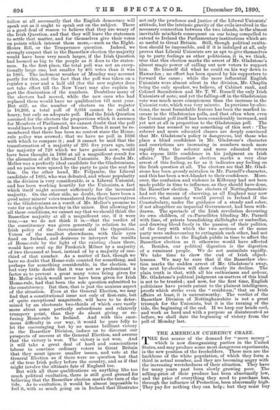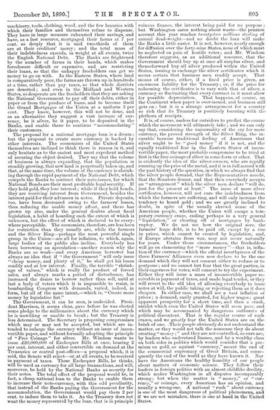THE AMERICAN CURRENCY CRAZE T HE first source of the demand
for " more money " which is now disorganising parties in the United States, and may produce some most dangerous experiments, is the new position of the freeholders. These men are the backbone of the white population, of which they form a third in actual number, and they are becoming angry with the increasing wretchedness of their situation. They have for many years past been slowly growing poor. The selling-price of their produce has been abnormally low, and the price of everything they need to purchase has, through the influence of Protection, been abnormally high. They pay for nothing they can help; but they must buy machinery, tools, clothing, wood, and the few luxuries with which their families and themselves refuse to dispense. They have in large measure exhausted their savings, and have, as a last resource, mortgaged their farms at 7 per cent. so deeply that it is said two-thirds of them are at their creditors' mercy ; and the total mass of their indebtedness exceeds, in weight at all events, twice the English National Debt. The Banks are frightened by the number of farms in their hands, which makes foreclosure difficult or expensive, and are restricting their loans, so that the unhappy freeholders can get no money to go on with. In the Eastern States, where land is comparatively poor, the farms are thrown up in hundreds at a time, rather than pay taxes, so that whole districts are deserted ; and even in the Midland and Western States, so desperate are the freeholders that they are asking the National Government to pay off their debts, either in paper or from the produce of loans, and to become itself the Grand Mortgagee of the Union at a uniform 3 per cent. They know, however, this will not be done, and as an alternative they suggest a vast increase of cur- rency, be it silver, be it paper, to be deposited in the Banks, and enable them- to continue " accommodating " their customers.
The proposal for a national mortgage loan is a dream ; but the proposal to create more currency is backed. by other interests. The economists of the United States themselves are inclined to think there is reason in it, and only hesitate as to the easiest and most expedient method of securing the object desired. They say that the volume of business is always expanding, that the population is steadily growing, that new land is perpetually taken up, and that, at the same time, the volume of the currency is shrink- ing through the rapid payment of the National Debt, which compels the Banks to contract their note-issues, for which National Bonds are their most profitable legal security. If they hold gold, they lose interest ; while if they hold. bonds, they are receiving interest from Government, besides the interest paid for their advances in notes. Private deposits, too, have been decreased owing to the farmers' losses, thus reducing the usable money afloat, and there has grown up also, under the general doubts about fiscal legislation, a habit of hoarding cash the extent of which is unknown, but the effect of which is declared to be every- where perceptible. The economists, therefore, are less keen for restriction than they usually are, while the farmers and the Silver Ring—perhaps the most powerful single group in the Union—are all for inflation, to which, again, large bodies of the public also incline. Everybody has been borrowing on speculation—another reason why the Banks are so weak—and every American borrower has always an idea that if " the Government " will only issue " cheap money, and plenty of it," he shall get his loans readily and at low interest. Finally, the terrible " shrink- age of values," which is really the product of forced sales, and always marks a period of disturbance, has increased the desire to borrow rather than sell, until at last a body of voters which it is impossible to resist, is bombarding Congress with demands, varied, indeed, in form, but all of the same intent, which is, " Create more money by legislative fiat." The Government, it can be seen, is undecided. Presi- dent Harrison, it seems clear, gave before he was elected some pledge to the millionaires about the currency which he is unwilling or unable to break ; but the Treasury is less determined. The Secretary is proposing compromises which may or may not be accepted, but which are in- tended to enlarge the currency without an issue of incon- vertible paper, and without formally adopting the principle of " Free Coinage" for silver. Mr. Windom wants to issue £20,000,000 of Exchequer Bills at once, bearing 2 per cent. interest, and either convertible on demand at the Treasuries or central post-offices—a proposal which, it is said, the Senate will reject—or, at all events, to be received in payment of taxes. These Exchequer Bills, he thinks, will be used as currency for all large transactions, and will, moreover, be held by the National Banks as security for their notes. The total effect of the proposal would be, in fact, a cheap national loan to the Banks to enable them to increase their note-currency, with this odd peculiarity, that instead of the Banks paying the Government for the accommodation, the Government would pay them 2 per cent. to induce them to take it. As the Treasury does not want the money represented by the loan, that is in principle ruinous finance, the interest being paid for no purpose ; but Washington cares nothing about waste—the pension account this year reaches twenty-two millions sterling of annual dead-weight—and no doubt the loan will make the Banks a little easier. It is not, however, nearly enough for diffusion over the forty-nine States, none of which must be neglected on pain of hostile votes ; and Mr. Windom therefore suggests, as an additional resource, that the Government should buy up at once all surplus silver, and thenceforward buy all silver produced within the United States, issuing in exchange the silver certificates which it seems certain that business men readily accept. That means of course, either, if a fixed price is given, an enormous liability for the Treasury ; or, if the price for redeeming the certificates is to vary with that of silver, a currency so fluctuating that every contract in it must allow for possible depreciation. That happens, of course, on the Continent when paper is over-issued, and business still gets on ; but it is a strange arrangement for a country so rich that its Treasury is positively bursting with the plethora of receipts.
It is, of course, useless for outsiders to predict the course which the movement will ultimately take ; and we can only say that, considering the universality of the cry for more currency, the proved strength of the Silver Ring, the in- curable because traditional feeling of Americans that silver ought to be " good money " if it is not, and the equally traditional fear in the Eastern States of incon- vertible paper, the most probable compromise to be tried at first is the free coinage of silver in sonic form or other. That is evidently the idea of the silver-owners, who are rapidly running up the price of the metal, and it is in full accord with the past history of the question, in which we always find that the silver people demand, that the Representatives accede, that the Senators demur, and that then everybody accepts an " arrangement " which the silver men declare " will do, just for the present at least." The issue of more silver certificates, however, will not cure the indebtedness from which the farmers are suffering, and will only increase the tendency to hoard gold ; and we are greatly inclined to doubt, in spite of the usually shrewd sense of the American people, whether the Union will escape a tem- porary currency craze, ending perhaps in a very general " liquidation," or clearing off of mortgages by bank- ruptcy. We do not see how the original sore, the farmers' huge debt, is to be paid off, except by a rise in prices, which cannot be created by legislation, and, if Europe abstains from war, may not occur naturally for years. Under those circumstances, the freeholders will go on clamouring for " more money "—that is, infla- tion of the currency—which the official mouthpieces of the three Farmers' Alliances even now declare to be the one demand which they will not consent either to reduce or to postpone ; and we cannot but fear that the great parties, in their eagerness for votes, will consent to try the experiment. Either they will issue a mass of inconvertible paper re- ceivable in payment of taxes, and made legal tender, or they will revert to the old idea of allowing everybody to issue- notes at will, the public taking or rejecting them as it does cheques. In either case, we shall see a vast inflation of prices ; a demand, easily granted, fo; higher wages ; great apparent prosperity for a short tithe, and then a crash, amidst which even the United States will seem poor, and which may be accompanied by dangerous outbursts of political discontent. That is the regular course of such crazes, and we greatly fear the United States are on the brink of one. . Their people obviously do not understand the matter, or they would not talk the nonsense they do about creating " money ; " and they are not controlled, as ours are by leaders who understand finance, and by a wealthy class on both sides in politics which would consider that a pre- mium on gold, as against " currency," meant the end of the commercial supremacy of Great Britain, and conse- quently the end of the world as they have known it. Nor have the Americans the healthy humility of our people about matters of economic science. They follow their leaders in foreign politics with an almost childlike docility, which makes Washington in all disputes incomparably strong ; but when the matter is " money," or " cur- rency," or coinage, every American has an opinion, and usually a wrong one. A national " rush " about currency is one of the most dangerous of political phenomena, and if we are not mistaken, there is one at hand in the United States.











































 Previous page
Previous page